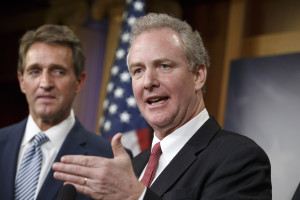
Lawmakers demand higher NIH funding from House Appropriations
As agencies demand more funding from Congress in the fiscal 2016 budget, many members want the National Institutes of Health to receive what the Senate...
As agencies demand more funding from Congress in the fiscal 2016 budget, many members want the National Institutes of Health to receive what the Senate Appropriations Committee has approved.
Rep. Chris Van Hollen (D-Md.) led a coalition of more than 100 members of Congress on Tuesday urging the House Appropriations Committee to increase its funding for the agency.
Both appropriations committees have approved funding increases for NIH in fiscal 2016, but differ slightly on the level of spending. The House version appropriates $31.2 billion for NIH, while the Senate version sets aside $32 billion for the agency.

In his outline for the fiscal 2016 budget, President Barack Obama proposed $31.31 billion in spending for NIH.
Neither bill has received a vote yet.
In a letter to House Appropriations Chairman Hal Rogers (R-Ky.) and Ranking Member Nita Lowey (D-N.Y.), Van Hollen’s bloc of representatives match the Senate’s spending level of $32 billion.
“Insufficient funding for NIH has a serious, wide-ranging impact on our nation’s health and our capacity for medical innovation in the 21st century,” the members wrote. “Particularly given the significant investments in NIH approved earlier this year by both the House and Senate Appropriations Committees, we feel strongly that now is the time to commit to our nation’s long-term health and prosperity.”
Van Hollen said that Congress has let NIH’s budget fall behind the rate of inflation for years, and has led to a 20 percent decrease in purchasing power since 2003.
“Indiscriminate budget cuts imposed on the agency during sequestration only further exacerbated this trend, reducing NIH’s budget by an additional 5 percent in FY 2013,” the members of Congress said in their letter.
Federal funding for the NIH supports more than 300,000 American jobs at 2,500 research institutions across the country.
More than 10 medical organizations, including the the American Association of Colleges of Pharmacy; the American Cancer Society Cancer Action Network; the American Diabetes Association and the American Heart Association, voiced their support for the letter.
“Patients are waiting. Robust funding for the NIH will allow scientists across the country to capitalize on promising research opportunities that have languished for far too long,” said Mary Woolley, President and CEO of Research!America.
Congress has until Dec. 11 to pass a budget for 2016 and avoid a government shutdown.
Copyright © 2025 Federal News Network. All rights reserved. This website is not intended for users located within the European Economic Area.
Jory Heckman is a reporter at Federal News Network covering U.S. Postal Service, IRS, big data and technology issues.
Follow @jheckmanWFED



